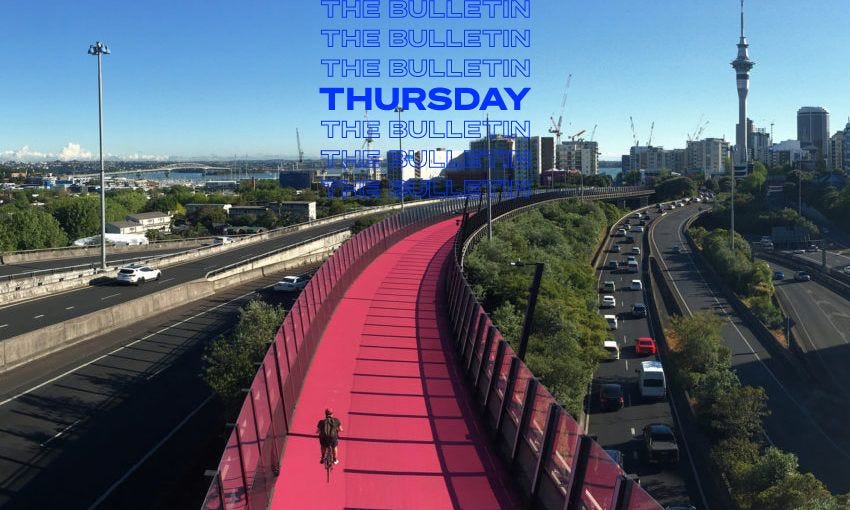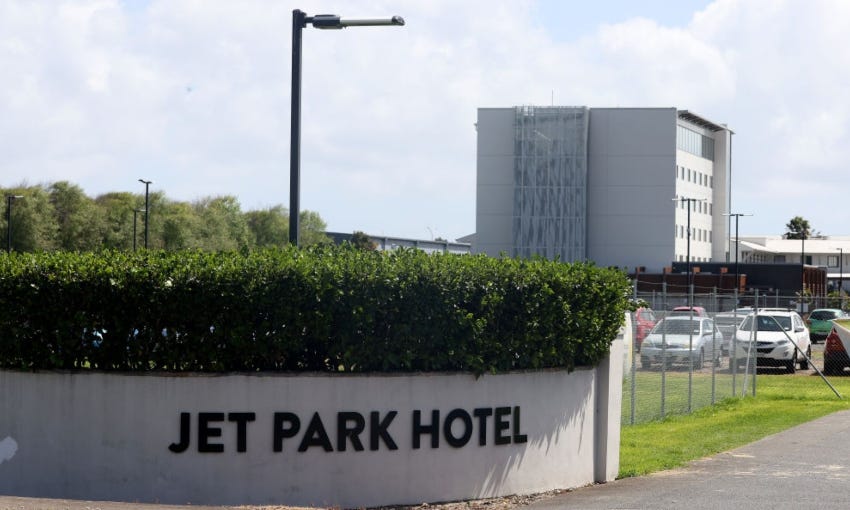A strategy to cut NZ's emissions
The climate change minister has explained, in broad strokes, how the country will begin to reduce greenhouse gases in the coming years
Mōrena and welcome to The Bulletin for Thursday, October 14, by Justin Giovannetti. Presented in partnership with Z Energy.
In today’s edition: Covid-19 is spreading in Auckland; Bay Dreams is cancelled; petrol hits a record high; but first, a plan to reduce the country’s climate emissions.
To meet our climate goals the government plans to cut driving by 20%. (Rafael Ben-Ari / Getty)
The government has released a draft plan to begin cutting New Zealand’s emissions. While there are significant gaps in the programme and months of consultations remain to nail down all the details, climate change minister James Shaw has unveiled the broad strokes of how the country will begin a long slog to reduce its greenhouse gas emissions. Following advice from the Climate Change Commission earlier this year, no sector of the economy will be untouched and the way New Zealanders live could change in ways both small and profound.
The plan arrives nearly a year after the government declared a climate emergency. The minister has said the paper itself is only the start of discussions with the public, with a final plan due in the middle of next year. However, he’ll be taking it to the COP26 climate conference in Glasgow in a few weeks. Shaw spoke with this newsletter last month about the conference and his plans.
Transportation will be at the centre of climate action. As Newsroom reports, the plan’s most detailed section revolves around transportation. For many people, this is where things will change. Zero-emissions vehicles need to make up 30% of the country’s light vehicle fleet (passenger and commercial vehicles) by 2035, along with a proposal to chop the distance travelled by cars by 20%. That means requiring city planners to build much more compact, walkable neighbourhoods soon. Auckland, Tauranga, Hamilton, Wellington, Christchurch and Queenstown will need to put forward plans that cut driving by 20%. That requires much more than a few extra bike lanes.
The reviews have already been fierce. Shaw chuckled yesterday when told that Greenpeace had already described the plan as “udder bullshit,” a reflection of the silence on reducing agricultural emissions. The government has a separate programme underway with agriculture, according to Shaw, explaining why the overall climate plan says there’s no role for the industry responsible for nearly half the country’s emissions. Other critics have focused on the lack of clarity and what some have described as a lack of ambition. All the proposals put forward so far don’t cut emissions by enough to match the country’s targets, according to Stuff. Significant debates around tree planting and the price of credits on the carbon market are also unresolved.
Does the plan rely too much on outsourcing emissions? In its analysis of the plan, the FIRST union raised concerns that almost half of the country’s expected emissions reduction over the next few years comes from the closure of the Marsden Point refinery. Under the most pessimistic scenario put forward by the government, the closure accounts for 95% of the country’s reductions by itself. “It is important to note that it will not actually reduce global emissions, it outsources them to other countries, many of which have lower environmental and labour standards than we do,” the union warned. Richard Wagstaff, president of the Council of Trade Union, made a similar argument in The Spinoff.
The government has also changed its climate plan to make it a bit easier in the short term. The NZ Herald reports that the amount of emissions we can put out in the next few years has been revised up, allowing for more creation of greenhouse gases, albeit at the cost of sharper reductions in decades to come.
The proposed size of the intervention might be fracturing the country’s bipartisan consensus. While a number of groups have criticised the plan for not going far enough, National party climate change spokesman Stuart Smith says it goes too far. “The plan should have simply stated an intention to continue the bipartisan consensus that the capped Emissions Trading Scheme will deliver most of our reductions, implement the agricultural programme He Waka Eke Noa and consider some measures to address forestry concerns and nudge people towards electric cars,” he said. New Zealand has benefited from a wide political consensus on climate change to this point. It’s unclear if Smith’s comments mean the consensus is now breaking.
If The Spinoff is important to you, please consider supporting our work.
A special note from The Spinoff publisher Duncan Greive: Without wanting to get too Bernie Sanders-meme with it, I am once again asking you to consider donating to help The Spinoff in its hour of need.
The delta outbreak struck just as we had made a major investment in new hires to grow what we can bring you on The Spinoff. We now have a head of data creating powerful charts to map the spread of the virus and rollout of the vaccine, a CTO to rebuild our site and upgrade our security and multiple brilliant new writers and editors like Reweti Kohere, Madeleine Holden and Chris Schulz. They are all creating important work under highly constrained circumstances — as are the rest of our 20-strong editorial team. Unfortunately delta has had a significant impact on our partnership work, which makes us more reliant than ever on the support of our audience.
So — if you're part of The Spinoff Members, thank you, from all of us. If you're not, and can donate, please do so today using this link — to keep on keeping on, we need you right now.
(A reminder: Every dollar donated through The Spinoff Members is ring-fenced to create more of our homegrown and independent journalism.)
Northland and parts of Waikato to remain in level three, government rules out stricter lockdown for Auckland. Covid-19 minister Chris Hipkins said the regions north and south of Auckland need to remain in lockdown until at least next Monday. The government lacks enough information in Northland and mystery cases continue to appear in Waikato, according to The Spinoff's live updates.
As case numbers continue to climb in Auckland, the minister said positive cases might soon need to stay in home isolation as quarantine fills up. “We’re going into a period where we are likely to see pretty significant growth in the number of cases,” said Hipkins. However, he ruled out a “circuit breaker” return to level four for the city.
The Covid numbers: 53 new community cases were reported yesterday in Auckland and 2 in Waikato. 40% (12) of the previous day’s total were in the community while infectious. There are now 529 active cases. 72,683 people were vaccinated on Tuesday.
The Spinoff’s Covid data tracker has the latest figures.
The country’s biggest music festival, Bay Dreams, has cancelled its summer events and blamed MIQ. Over 40,000 people were expected at festivals in Nelson and Tauranga this summer, but organisers say they can’t get the right acts due to border restrictions, Stuff reports. All ticket holders will be refunded. The line-up was supposed to showcase a number of Australian and European stars, but the collapse of the trans-Tasman bubble shattered plans. Smaller concerts with local talent will be held instead.
The government’s pivot from elimination last week caught health experts by surprise. The Guardian reports that epidemiologists and public health experts like Michael Baker were not consulted before last Monday’s announcement. Previous decisions in the Covid response had been run past independent experts, so Baker said it was pretty surprising that a shift away from the country’s central strategy didn’t warrant a chat. The government still hasn’t released the health advice the prime minister said informed the decision.
The Spinoff is now accepting applications for The Next Page, a new mentorship programme for three emerging feature writers to work full-time for 23 weeks in 2022 across a range of publications. Nau mai, haere mai!
As part of the programme, The Spinoff is also hosting two online events in October where you’ll get to hear from some of the editors and journalists you might be working with—their journey, the challenges and their advice—and to ask any questions you might have. Register here for the first event on October 20.
Have petrol prices seemed high? You aren’t dreaming. Stuff reports that the price of petrol has hit an all-time high, with the national average for 91 hitting $2.39 a litre. Demand for oil has surged as countries around the world have dropped Covid-19 restrictions, pushing up the price of a barrel of oil by 60% this year. The value of credits has also jumped significantly on New Zealand’s carbon market, adding to petrol costs. There are warnings that the price at the pump will only keep climbing as global oil production hasn’t increased to meet demand.
Inside the community ‘just asking questions’ about the vaccines. Dylan Reeve writes for The Spinoff about meeting with New Zealanders who are holding out on getting vaxxed. He wants to better understand them and what drives suspicion towards Covid-19 vaccines, despite a clear consensus around the world that vaccines are safe and effective. It’s a fascinating look. One takeaway is that compassion and understanding is really the best response, in most cases, to those who have avoided a vaccine so far. Here’s a small sample of what he wrote:
“One thing that is clear, however, is the community isn’t homogenous….Far-left anarchists find themselves co-mingling with New Conservatives voters. Many members lean toward eco-friendly ideals and natural health, while others would rubbish such ideas in any other context. Without the commonality of their Covid views, members might have never encountered each other online.”
Got some feedback about The Bulletin, or anything in the news?
Get in touch with me at thebulletin@thespinoff.co.nz
Positive cases may soon be asked to self-isolate at home. (Phil Walter/Getty Images)
Right now on The Spinoff: Toby Manhire explores what it means for the Covid response that Auckland can now expect 100 new cases a day within a fortnight. Comedian Ruby Esther tells FIRST about her most upsetting heckler and making her day cry (in a nice way, maybe). Alex Casey lists 15 things you can do during your 15 minute post-jab wait. Tara Ward power ranks week six of Celebrity Treasure Island and finds no one is having fun. Anna Rawhiti-Connell writes about the end of beauty rituals as Tāmaki Makaurau enters week nine of lockdown.
The NHL ice hockey season starts today and a number of changes are coming. The Guardian offers a series of predictions and storylines to watch out for as play returns to the rinks. Some changes are minor, like coaches and players on the sidelines won’t need to wear tailored suits anymore as the league has relaxed rules for what had been a surprisingly formal sport. Others issues are more significant, like the winter Olympics in Beijing and the best player in a generation still shackled to a team that can’t win. At the start of the season I can always hold onto hope that this is the year a Canadian team wins the cup, ending a 29 year drought.
That's it for The Bulletin. If you want to support the work we do at The Spinoff, please check out our membership programme.







